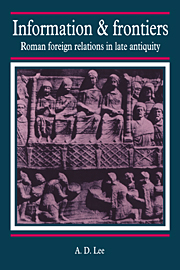Book contents
- Frontmatter
- Contents
- Preface
- Chronological list of selected Roman emperors (early third to early seventh century)
- Chronological list of Sasanian kings (220s–628)
- Map 1 The Middle East in late antiquity
- Map 2 Northern Mesopotamia and adjacent regions
- Map 3 The middle and lower Danube and adjacent regions
- Map 4 The Rhine and upper Danube and adjacent regions
- List of abbreviations
- Introduction
- PART I CONTEXTS
- PART II INFORMATION AND UNCERTAINTY
- PART III SOURCES OF INFORMATION
- 5 Diffusion of information
- 6 Information-gathering
- Select bibliography
- Index of sources
- General index
5 - Diffusion of information
Published online by Cambridge University Press: 29 September 2009
- Frontmatter
- Contents
- Preface
- Chronological list of selected Roman emperors (early third to early seventh century)
- Chronological list of Sasanian kings (220s–628)
- Map 1 The Middle East in late antiquity
- Map 2 Northern Mesopotamia and adjacent regions
- Map 3 The middle and lower Danube and adjacent regions
- Map 4 The Rhine and upper Danube and adjacent regions
- List of abbreviations
- Introduction
- PART I CONTEXTS
- PART II INFORMATION AND UNCERTAINTY
- PART III SOURCES OF INFORMATION
- 5 Diffusion of information
- 6 Information-gathering
- Select bibliography
- Index of sources
- General index
Summary
the preceding part of this study has shown that information of strategic and wider significance was obtained by the empire during late antiquity, and that there was a significant difference between the levels of information that the Romans possessed about the Persians on the one hand and northern peoples on the other. This third and final part of the study considers the question of how this information was acquired, and suggests reasons for the difference between east and north. Officially initiated information-gathering through agencies such as spies and embassies is one obvious subject requiring investigation, and this will be taken up in Chapter 6. But it is apparent that some information entered the empire (as well as leaving it) through informal channels: the interaction of ordinary inhabitants on either side of the empire's boundaries, already discussed in detail in Chapter 2, did not occur without the transmission of news. This phenomenon is the concern of the present chapter.
All too often in the cases discussed in Chapter 4 the agency by which information was acquired is not specified. As has been seen, late Roman writers frequently employ generalised expressions to the effect that an official or officer ‘heard’ or ‘learned’ an item of information, without specifying the source of this knowledge.
Information
- Type
- Chapter
- Information
- Information and FrontiersRoman Foreign Relations in Late Antiquity, pp. 147 - 165Publisher: Cambridge University PressPrint publication year: 1993
